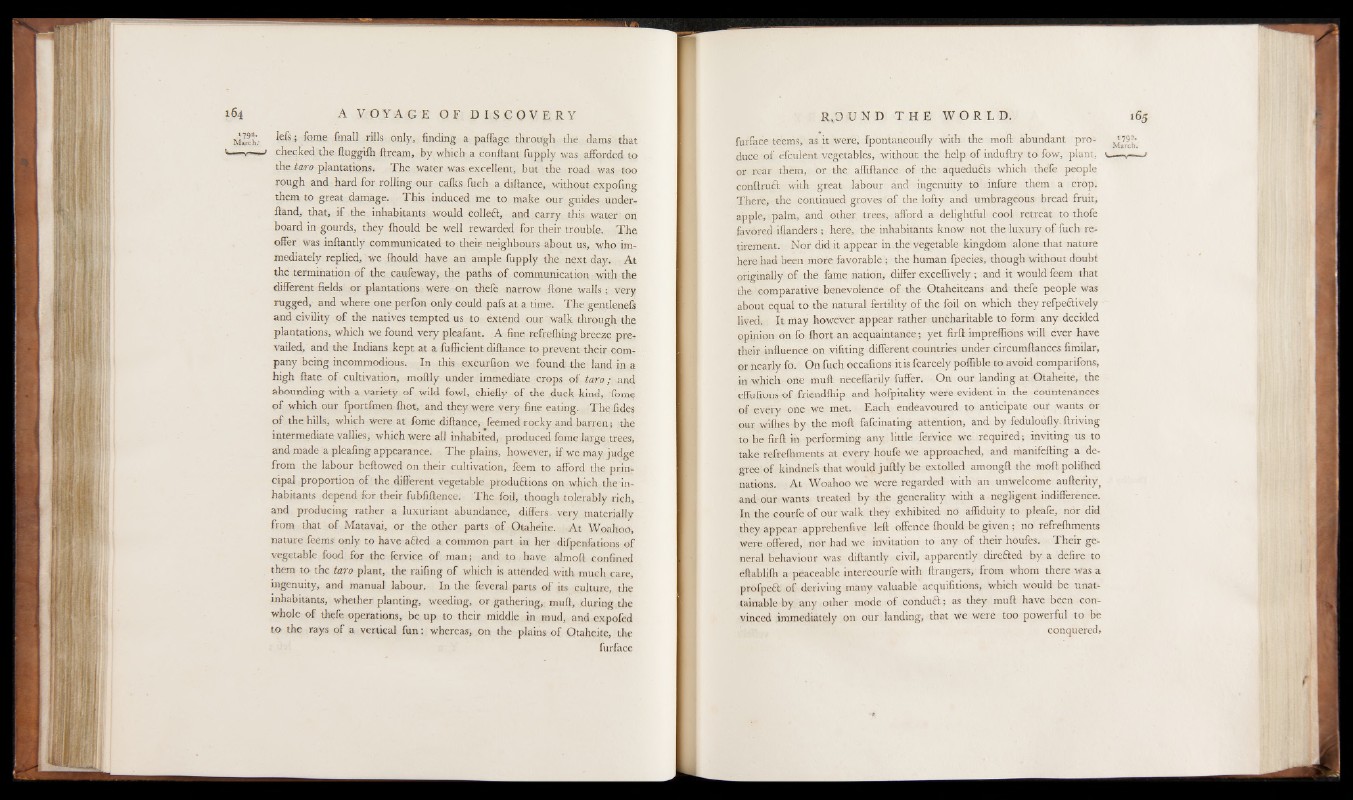
mS - -e^ » fQrae final! rills only, finding a paffage through die dams that
---- ' checked the fluggilh ftream, by which a conftant fupply was afforded to
the taro plantations. The water was excellent, but the road was too
rough and hard for rolling our calks fuch a diltance, without expofing
them to great damage. This induced me to make our guides underhand,
that, if the inhabitants would colleft, and carry this water on
board in gourds, they Ihould be well rewarded for their trouble. The
offer was inftantly communicated to their neighbours about us, who immediately
replied, we Ihould have an ample fupply the next day. At
the termination o f the caufeway, the paths o f communication with the
different fields or plantations were on thefe narrow Hone walls ; very
rugged, and where one perfon only could pafs at a time. The gentlenefs
and civility of the natives tempted us to extend our walk through the
plantations, which we found very pleafant. A fine refrelhing breeze prevailed,
and the Indians kept at a fufficient diltance to prevent their company
being incommodious. In this excurfion we found the land in a
high Hate o f cultivation, mollly under immediate crops of taro; and
abounding with a variety of wild fowl, chiefly of the duck kind, fome
o f which our fportfmen Ihot, and they were very fine eating. The fides
of the hills, which were at fome diltance, teemed rocky and barren; the
intermediate vallies, which were all inhabited, produced fome large trees,
and made a pleafing appearance. The plains, however, if we may judge
from the labour bellowed on their cultivation, feem to afford the principal
proportion of the different vegetable produftions on which the inhabitants
depend for their fubfiltence. The foil, though tolerably rich,
and producing rather a luxuriant abundance, differs, very materially
from that of Matavai, or the other parts of Otaheite. At Woahoo,
nature feems only to have a£ied a common part in her difpenfations of
vegetable food for the fervice of man; and to have almolt confined
them to the taro plant, the raifing of which is attended with much care,
ingenuity, and manual labour. In the feveral parts o f its culture, the
inhabitants, whether planting, weeding, or gathering, mult, during the
whole of thefe operations, be up to their middle in mud, and expofed
to the rays of a vertical fun; whereas, on the plains of Qtaheite, the
furface
furface teems, as it were, fpontaneoufly with the moll abundant pro- ^ 79=*
duce of efculent vegetables, without the help of indultry to fow, plant, 1- —
or rear them, or the affiltance of the aquedufts which thefe people
conltruft with great labour and ingenuity to infure them a crop.
There, the continued groves of the lofty and umbrageous bread fruit,
apple, palm, and other trees, afford a delightful cool retreat to thofe
favored iflanders ; here, the inhabitants know not the luxury of fuch retirement.
Nor did it appear in .the vegetable kingdom alone that nature
here had been more favorable ; the human fpecies, though without doubt
originally of the fame nation, differ exceffively ; and it would feem that
the comparative benevolence o f the Otaheiteans and thefe people was
about equal to the natural fertility of the foil on which they refpe&ively
lived. It may however appear rather uncharitable to form any decided
opinion on fo Ihort an acquaintance; yet firlt impreflions will ever have
their influence on vifiting different countries under circumllances fimilar,
or nearly fo. On fuch occafions it is fcarcely poffible to avoid comparifons,
in which one mull neceffarily fuffer. On our landing at Otaheite, the
effufions of friendfhip and hofpitality were evident in the countenances
of every one we met. Each endeavoured to anticipate our wants or
our wilhes by the moll fafcinating attention, and by feduloully. llriving
to be firll in performing any little fervice we required; inviting us to
take refrefhments at every houfe we approached, and manifelling a degree
of kindnefs that would jullly be extolled amongll the moll polilhed
nations. At Woahoo we were regarded with an unwelcome aufterity,
and our wants treated by the generality with a negligent indifference.
In the courfe of our walk they exhibited no affiduity to pleafe, nor did
they appear apprehenfive left offence Ihould be given ; no refrefhments
were offered, nor had we invitation to any of their houfes. Their general
behaviour was diftantly civil, apparently direfted by a defire to
eftablilh a peaceable intercourfe with ftrangers, from whom there was a
profpefl of deriving many valuable acquifitions, which would be unattainable
by any other mode of conduct; as they mull have been convinced
immediately on our landing, that we were too powerful to be
conquered,